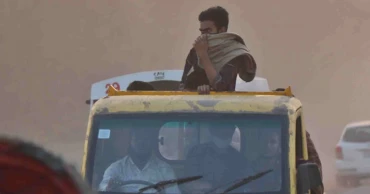air
Unhealthy air grips Dhaka, ranks second globally
Dhaka, the densely populated capital of Bangladesh, ranked second among the world’s most polluted cities on Wednesday morning, recording an Air Quality Index (AQI) of 282 at 8:18 am.
Today, the city’s air was classified as ‘very unhealthy’, indicating a serious health threat, according to the AQI report.
Delhi in India, Kolkata in India and Karachi in Pakistan occupied the first, third, and fourth spots on the list, with AQI scores of 326, 193, and 176 respectively.
According to the AQI scale, a reading between 50 and 100 is considered ‘moderate’, with generally acceptable air quality, though sensitive individuals should limit prolonged outdoor exertion. AQI levels of 101–150 are ‘unhealthy for sensitive groups’, 151–200 is ‘unhealthy’, 201–300 is ‘very unhealthy’, and readings above 301 are considered ‘hazardous’, posing severe health risks.
Dhaka ranks second globally for air pollution with AQI at 288
The AQI, which reports daily air quality, informs residents how clean or polluted the air is and highlights potential health effects. In Bangladesh, the AQI is calculated based on five key pollutants: particulate matter (PM10 and PM2.5), nitrogen dioxide (NO2), carbon monoxide (CO), sulfur dioxide (SO2), and ozone.
Dhaka has long struggled with air pollution. Air quality usually deteriorates in winter and improves during the monsoon season.
The World Health Organization (WHO) estimates that air pollution causes about seven million deaths worldwide each year, primarily from stroke, heart disease, chronic obstructive pulmonary disease, lung cancer, and acute respiratory infections.
21 days ago
Unhealthy air grips Dhaka, ranks second globally
Dhaka, the densely populated capital of Bangladesh, ranked second among the world’s most polluted cities on Friday morning.
At 8:22 am, Dhaka recorded an air quality index (AQI) score of 190 and classified it as ‘unhealthy’ as reported by IQAir.
Delhi in India, Kuwait City in Kuwait, and Ulaanbaatar in Mongolia occupied the first, third, and fourth spots on the list, with AQI scores of 194, 186, and 181 respectively.
According to the AQI scale, a reading between 50 and 100 is considered ‘moderate’, with generally acceptable air quality, though sensitive individuals should limit prolonged outdoor exertion.
Air quality worsens as Dhaka tops global pollution ranking
AQI levels of 101–150 are ‘unhealthy for sensitive groups’, 151–200 is ‘unhealthy’, 201–300 is ‘very unhealthy’, and readings above 301 are considered ‘hazardous’, posing severe health risks.
The AQI, which reports daily air quality, informs residents how clean or polluted the air is and highlights potential health effects. In Bangladesh, the AQI is calculated based on five key pollutants: particulate matter (PM10 and PM2.5), nitrogen dioxide (NO2), carbon monoxide (CO), sulfur dioxide (SO2), and ozone.
Dhaka has long struggled with air pollution. Air quality usually deteriorates in winter and improves during the monsoon season.
Dhaka’s air continues to be ‘very unhealthy’
The World Health Organization (WHO) estimates that air pollution causes about seven million deaths worldwide each year, primarily from stroke, heart disease, chronic obstructive pulmonary disease, lung cancer, and acute respiratory infections.
1 month ago
Dhaka’s air ‘unhealthy for sensitive groups’ this morning amid rising pollution
Dhaka, the overcrowded capital city of Bangladesh, has ranked 11th on the list of cities with the worst air quality with an AQI score of 103 at 10:30am this morning (June 21, 2025).
Today Dhaka’s air was classified as ‘Unhealthy for sensitive groups,’ according to the AQI index. Such air quality continued for the past few days.
When the AQI value for particle pollution is between 50 and 100, air quality is considered ‘moderate’, usually sensitive individuals should consider limiting prolonged outdoor exertion, between 101 and 150, air quality is considered ‘unhealthy for sensitive groups’, between 150 and 200 is ‘unhealthy’, between 201 and 300 is said to be 'very unhealthy', while a reading of 301+ is considered 'hazardous', posing serious health risks to residents.
Uganda’s Kampala, Democratic Republic of the Congo’s Kinshasa and Indonesia’s Batam cities respectively occupied the first, second and third spots on the list, with AQI scores of 155, 147 and 139 respectively.
Dhaka’s air quality continues to be ‘moderate’
The AQI, an index for reporting daily air quality, informs people how clean or polluted the air of a certain city is and what associated health effects might be a concern for them.
The AQI in Bangladesh is based on five pollutants: particulate matter (PM10 and PM2.5), NO2, CO, SO2, and ozone.
Dhaka has long been grappling with air pollution issues. Its air quality usually turns unhealthy in winter and improves during the monsoon.
As per World Health Organization (WHO), air pollution kills an estimated seven million people worldwide every year, mainly due to increased mortality from stroke, heart disease, chronic obstructive pulmonary disease, lung cancer, and acute respiratory infections.
8 months ago
Builders in Dhaka fined for violating air pollution rules
The Ministry of Environment, Forest and Climate Change conducted two mobile court drives in Dhanmondi and Badda areas of Dhaka on Thursday to curb air pollution caused by uncovered construction materials.
In Dhanmondi, a mobile court led by Deputy Secretary and Executive Magistrate Siddhartha Shankar Kundu fined a building authority Tk 10,000 for keeping construction materials in the open, violating the Air Pollution (Control) Rules, 2022, said a media release sent from the ministry on Friday morning.
Dhaka’s air quality turns ‘moderate’ this morning
The building authority was ordered to remove the materials within two hours, with several other institutions warning, reads it.
Meanwhile, in Aftabnagar, Badda, Senior Assistant Secretary and Executive Magistrate Sadia Islam Luna conducted another court fining six under-construction sites a total of Tk 35,000 for the same offense and issued warnings to others.
The ministry vows to continue mobile court to enforce environmental laws and control air pollution, according to it.
10 months ago
Dhaka’s air quality moderate this morning
Dhaka, the overcrowded capital city of Bangladesh, has ranked the 13th on the list of cities with the worst air quality with an AQI score of 99 at 9:10am this morning (October 4, 2024).
Today’s air was classified as 'moderate', according to the AQI index.
When the AQI value for particle pollution is between 50 and 100, air quality is considered ‘moderate’, usually sensitive individuals should consider limiting prolonged outdoor exertion, between 101 and 150, air quality is considered ‘unhealthy for sensitive groups’, between 150 and 200 is ‘unhealthy’, between 201 and 300 is said to be 'very unhealthy', while a reading of 301+ is considered 'hazardous', posing serious health risks to residents.
Pakistan’s Lahore, Uganda’s Kampala and India’s Delhi occupied the first, second and third spots in the list, with AQI scores of 200, 184 and 159, respectively.
The AQI, an index for reporting daily air quality, informs people how clean or polluted the air of a certain city is and what associated health effects might be a concern for them.
Read: Despite rain, Dhaka's air quality 'moderate' this morning
The AQI in Bangladesh is based on five pollutants: particulate matter (PM10 and PM2.5), NO2, CO, SO2, and ozone.
Dhaka has long been grappling with air pollution issues. Its air quality usually turns unhealthy in winter and improves during the monsoon.
As per World Health Organization (WHO), air pollution kills an estimated seven million people worldwide every year, mainly due to increased mortality from stroke, heart disease, chronic obstructive pulmonary disease, lung cancer, and acute respiratory infections.
Read more: Dhaka’s air quality still marks ‘unhealthy’
1 year ago
Dhaka's air quality remains in the 'moderate' range
Dhaka's air quality continued to be in the ‘moderate’ zone this morning.
With an air quality index (AQI) score of 103 at 8:56 am, Dhaka ranked 9th on the list of cities worldwide with the worst air quality.
The United Arab Emirates' Dubai, Indonesia’s Jakarta and Uganda’s Kampala occupied the first three spots on the list, with AQI scores of 161, 156 and 141, respectively.
Dhaka's air quality 'unhealthy' yet again
An AQI between 50 and 100 is considered ‘moderate’ with acceptable air quality. However, there may be a health concern for a very small number of people who are unusually sensitive to air pollution.
Thanks to rain, Dhaka's air quality 'moderate' this morning
In Bangladesh, the AQI is based on five criteria pollutants: particulate matter (PM10 and PM2.5), NO2, CO, SO2 and Ozone.
Dhaka has long grappled with air pollution issues. Its air quality usually turns unhealthy in the winter and improves during the monsoon.
Dhaka's air quality ‘unhealthy for sensitive groups’ this morning
Air pollution consistently ranks among the top risk factors for death and disability worldwide.
As per the World Health Organization (WHO), air pollution kills an estimated seven million people worldwide every year.
2 years ago
Dhaka's air quality continues to be 'moderate'
Dhaka's air quality continued to be in the ‘moderate’ zone this morning (July 03, 2023), thanks to the torrential rain for the past couple of days and thin traffic, since the capital isn't yet back to its usual hustle and bustle following the Eid holidays.
With an air quality index (AQI) score of 74 at 9:15 am, Dhaka ranked 19th in the list of cities worldwide with the worst air quality.
South Africa’s Johannesburg, Indonesia’s Jakarta, and Chile’s Santiago occupied the first three spots on the list, with AQI scores of 161, 156 and 152, respectively.
An AQI between 50 and 100 is considered ‘moderate’ with an acceptable air quality. However, there may be a moderate health concern for a very small number of people who are unusually sensitive to air pollution.
Read more: Plastic Pollution: Harmful effects on human health and environment
Besides, an AQI between 150 and 200 is considered 'unhealthy', AQI between 201 and 300 is said to be 'very unhealthy', while a reading of 301+ is considered 'hazardous', posing serious health risks to residents.
In Bangladesh, the AQI is based on five criteria pollutants — Particulate Matter (PM10 and PM2.5), NO2, CO, SO2 and Ozone.
Dhaka has long been grappling with air pollution issues. Its air quality usually turns unhealthy in winter and improves during the monsoon.
Air pollution consistently ranks among the top risk factors for death and disability worldwide.
Read more: HC summons N’ganj DC, DoE officials for not complying with directives to control air pollution
As per the World Health Organization (WHO), air pollution kills an estimated seven million people worldwide every year.
2 years ago
Dhaka’s air unhealthy for sensitive groups this morning
Dhaka’s air ranked 6th most polluted in the world this morning (June 4, 2023) as per the Air Quality Index (AQI).
The air in Dhaka was categorised as ‘unhealthy for sensitive groups’, with an AQI score of 147 at 9:50 am.
Iraq's Baghdad, Qatar's Doha and India's Delhi occupied the first three spots on the list, with AQI scores of 718, 163, and 156, respectively.
Read: Urgent, coordinated actions needed to curb air pollution in South Asia: World Bank
When the AQI value for particle pollution is between 101 and 150, air quality is considered ‘unhealthy for sensitive groups’, between 151 and 200 is ‘unhealthy’, between 201 and 300 is said to be 'very unhealthy', while a reading of 301+ is considered 'hazardous', posing serious health risks to residents.
In Bangladesh, the AQI is based on five criteria pollutants — particulate matter (PM10 and PM2.5), NO2, CO, SO2, and Ozone.
Dhaka has long been grappling with air pollution issues. Its air quality usually turns unhealthy in the winter and improves during the monsoon.
Read more: Environment Minister wants Britain's cooperation in tackling climate risk.
2 years ago
Dhaka's air most polluted in the world this morning
The densely populated capital of Bangladesh, Dhaka, has once again topped the list of cities around the world with the worst air quality.
Dhaka's air quality was recorded at 159 at 8:55 am on Thursday, according to Air Quality Index (AQI).
India’s Delhi and Pakistan’s Lahore occupied the next two spots, with AQI scores of 158 and 157, respectively.
An AQI between 151 and 200 is said to be ‘unhealthy’ while 201 and 300 is considered ‘very unhealthy’, and 301 to 400 is ranked 'hazardous', posing serious health risks to residents.
Also read: No improvement in Dhaka's air quality, still 'unhealthy' this morning
In Bangladesh, the AQI is based on five criteria pollutants -- Particulate Matter (PM10 and PM2.5), NO2, CO, SO2 and Ozone.
Dhaka has long been grappling with air pollution issues. Its air quality usually turns unhealthy in winter and improves during the monsoon.
As per the World Health Organization (WHO), air pollution kills an estimated seven million people worldwide every year, largely as a result of increased mortality from stroke, heart disease, chronic obstructive pulmonary disease, lung cancer and acute respiratory infections.
2 years ago
Amid record high temperature, Dhaka’s air 5th most polluted in the world this morning
As the heatwave severely impacts public life, with an air quality index (AQI) score of 158 at 9:40 am today (April 17, 2023), Dhaka ranked 5th in the list of cities worldwide with the worst air quality.
India’s Delhi, Nepal’s Kathmandu and Thailand’s Chiang Mai occupied the first three spots in the list, with AQI scores of 228, 198 and 165, respectively.
An AQI between 101 and 150 is considered 'unhealthy', AQI between 201 and 300 is said to be 'very unhealthy', while a reading of 301+ is considered 'hazardous', posing serious health risks to residents.
Also Read: Dhaka's air 4th most polluted in the world this morning
In Bangladesh, the AQI is based on five criteria pollutants -- Particulate Matter (PM10 and PM2.5), NO2, CO, SO2 and Ozone.
Dhaka has long been grappling with air pollution issues. Its air quality usually turns unhealthy in winter and improves during the monsoon.
Air pollution consistently ranks among the top risk factors for death and disability worldwide.
As per the World Health Organization (WHO), air pollution kills an estimated seven million people worldwide every year, largely as a result of increased mortality from stroke, heart disease, chronic obstructive pulmonary disease, lung cancer and acute respiratory infections.
Read More: Inverter AC Prices in Bangladesh in 2023
2 years ago



















